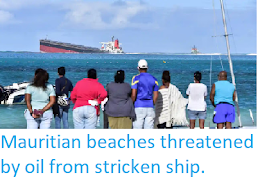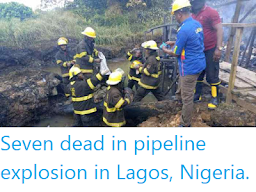Concerns are being raised about the possibility of a major new pollution incident in the Indian Ocean originating from a burning oil tanker off the coast of Sri Lanka. The Panamanian-registered, Liberian-owned MT New Diamond, classified as aa Very Large Crude Carrier, suffered an explosion in its engine room on Thursday 3 September 2020, in which one crew member, described as a Philippine national, died. Since then the remaining 22 members of the crew, all Greek and Philippine nationals, have been evacuated, but fire-fighting and rescue teams from the Sri Lankan Navy, Indian Navy, Indian Coast Guard, Indian Air Force, and Russian Navy have been unable to contain a fire on board the ship that resulted from the explosion. A small amount of oil has been sighted leaking from the ship, and a 2 m crack has been seen in the hull, though at the current time this is above the water. The vessel is currently about 65 km off the coast of Sri Lanka, and being towed further away, but there are concerns that if the fire cannot be brought under control, or the majority of the 2 million barrels (318 million litres) of crude oil on board removed safely, then the incident could present a major threat to the beaches of southern India, Sri Lanka, and the Maldives.
The MT New Diamond is owned by the Monrovia-based Porto Emporios Shipping Inc., but had been chartered by the Indian Oil Corporation to ship Kuwait Export Crude from the port of Mina Al Ahmadi in Kuwait to the Indian port of Paradip, where the Indian Oil Corporation has a refinery capable of processing 300 000 barrels of crude oil per day. Like many such vessels it is registered in Panama, home to the world's largest shipping registry. Panama has long been accused of having exceptionally lax shipping regulations, and recent incidents involving Panama-registered ships in harbours or close to shores in Lebanon, the Yemen, Venezuela, and Mauritius, have led to widespread criticism of the registry even within the shipping industry.
Oil spills are potentially harmful to marine life in a variety of ways. Most obviously it can coat the outside of organisms, causing damage to external structures such as the feathers of Birds and fur of Mammals, as well as smothering many marine invertebrates and plants. It also contains a variety of chemicals which can be directly toxic upset the hormonal balance of many animals. Oil also impedes the feeding of marine organisms, coating both food and feeding organs, but provides an excellent food source for Bacteria, which can lead to Eutrophication events - dramatic increases in Bacteria numbers, which then use all the oxygen in the water, leading other organisms to asphyxiate.
See also...


Follow Sciency Thoughts on Facebook.






